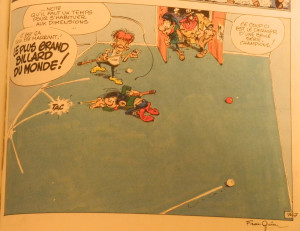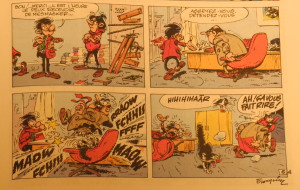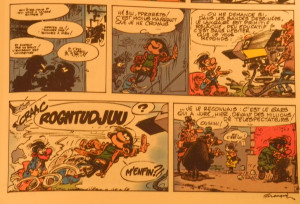As pointed out by Philippe, this abstruse goose cartoon shows that analytic number theory is now part of the Zeitgeist.
Category: Arts
On diplomats
Quizz: who wrote
Il a publié il y a deux ans (…) un ouvrage relatif au sentiment de l’Infini sur la rive occidentale du lac Victoria-Nyanza et cette année un opuscule moins important, mais conduit d’une plume alerte, parfois même acérée, sur le fusil à répétition dans l’armée bulgare, qui l’ont mis tout à fait hors de pair.
or, in translation:
He has published two years ago (…) a book concerning the feeling of Infinity on the occidental shore of the Victoria-Nyanza lake, and this year another booklet, less important but written with a lively, and even piercing, pen, on the repeating rifle in the bulgarian army, which have made him rather peerless.
This reminds of the curiously little-known hilarious “Antrobus stories” of diplomatic mishaps:
It was during one of those long unaccountable huffs between ourselves and the Italians. You know the obscure vendettas which break out between Missions? Often they linger on long after the people who threw the first knife have been posted away. I have no idea how this huff arose. I simply inherited it from bygone dips whose bones were now dust. It was in full swing when I arrived — everyone applying freezing-mixture to the Italians and getting the Retort Direct in exchange. (…) So while bows were still exchanged for protocol reasons they were only, so to speak, from above the waist. A mere contortion of the dickey, if you take me, as a tribute to manners. A slight Inclination, accompanied by a moue. Savage work, old lad, savage work!
(from “The game’s the thing”, where a soccer game between the English and Italian embassies rather degenerates.)
More things of the day(s)
(1) Today’s Word of The Day in the OED: afanc, which we learn is
In Welsh mythology: an aquatic monster. Also: an otter or beaver identified as such a monster.
Maybe the Welsh otters, like their rugbymen, are particularly fierce?
(2) Yesterday’s Google doodle, in Switzerland at least, celebrated the 57th birthday of Gaston Lagaffe
I’ve heard that Gaston

is mostly unknown to the US or English, leaving many people with no reaction to the mention of the contrats de Mesmaeker

or to the interjection Rogntudju!.
This lack of enlightenment is a clear illustration of the superiority of the continental mind.
This will be counting but
For the first time ever, I have temporarily reached the top of the culture pecking order in France, since I was able to go see “Einstein on the Beach” during its run at the Théâtre du Châtelet in January. This was clearly “the” évènement to attend (even two months or so before, buying two good contiguous seats was almost impossible), and the reactions of the audience suggested that many people were there because of the “the” instead of their desire to see the évènement, and were correspondingly a bit nonplussed by the work. Thus the two people sitting on my right left after a bit more than a third of the opera. (It was clearly indicated that, during the performance, which is a bit longer than four hours and has no intermission, it was allowed to leave and come back as desired, but they did not reappear).
Personally, I knew the music extremely well and it was a great pleasure to finally see the full spectacle. I had already attended two other Robert Wilson stagings, and I like his style (i.e., I have no objection to watching a light pillar move from horizontal to vertical in the space of twenty minutes or so), but it was the first time I saw a full-length Glass opera live, and I’d have paid gladly quite a bit more than I did.
The full staging certainly answers a few of the puzzled questions one might get from the music alone. In particular, the scenes entitled “Dance 1” and “Dance 2” felt more alive when seen as, well, dances. In fact, I arbitrarily decided that the first represents electromagnetism (it begins with a voice saying “Bern, Switzerland, 1905”), and the second nuclear forces (a sinister character crosses the stage and I see it as representing the potential for evil arising from nuclear physics). Einstein would have appreciated that, despite the random-looking evolutions of the dancers, these were certainly not the result of dice throws, since collisions would certainly have been unavoidable otherwise.
One of the Paris representations was filmed, and shown on French television, so that it can be found on the internet. However, I watched it a bit, and the fact that there are many cameras giving different angles of view seems to diminish the full immersive effect of the live show. But that’s certainly better than nothing…

